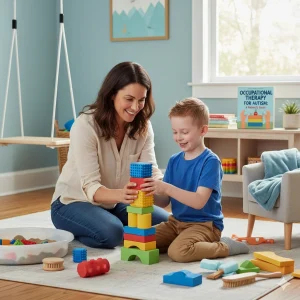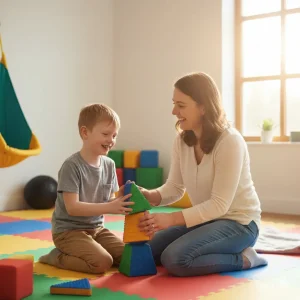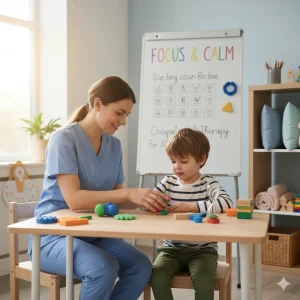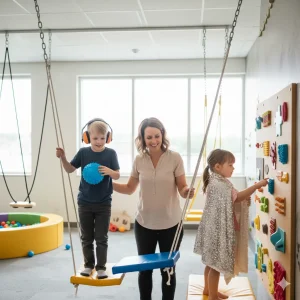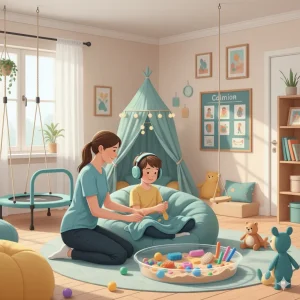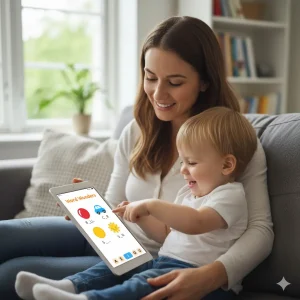Speech Delay vs Late Talker: Know the Signs and Solutions
Last Updated: August 6, 2025
Worried your toddler isn’t talking as much as other kids their age? You’re not alone — and it doesn’t always mean something is wrong. Some children are simply late talkers, while others may be showing signs of a speech delay. Understanding the difference between speech delay vs late talker can help you decide when to wait, when to take action, and how to support your child’s speech at home.
In this guide, we’ll break down what it means to be a late talker vs. having a speech delay, the red flags to watch for at each age, and when it’s time to seek help. Whether your child just needs more time or could benefit from early speech therapy, this article will help you take the next best step with confidence.
Free Speech Help for Kids
Concerned about speech delays? Book a free consultation with our expert speech therapist and get guidance tailored to your child’s needs.
What Does It Mean to Be a Late Talker?
Every child grows at their own pace, especially when it comes to talking. Some toddlers start chatting early, while others take a little more time to find their voice. If your child understands what you say, uses gestures like pointing or waving, but isn’t using many words yet — they might simply be a late talker.
A late talking toddler is typically between 18 to 30 months old, has good understanding of language, plays normally, and hits other milestones on time — but uses fewer words than expected for their age. You might hear people describe them as “slow to talk,” and it can be confusing to know if it’s something to worry about.
The good news? Many late talkers do catch up, especially with the right support at the right time. It’s important, though, to watch how your child is growing in both speech and understanding. If your toddler seems to follow instructions (“Get your shoes”), points to things they want, and reacts to your words — these are positive signs.
Also read: Is My Child Just a Late Talker or Showing Signs of a Delay?
What Is a Speech Delay in Toddlers?
A speech delay in toddlers means your child isn’t developing speech skills at the expected rate for their age. This doesn’t just mean they talk late — it can also mean they say fewer words than other children their age or struggle to form simple sentences.
There are two main types of language involved:
| Type of Language | What It Means | Example |
|---|---|---|
| Expressive Language | How your child uses words to express themselves | Saying “milk” or “I want toy” |
| Receptive Language | How well your child understands what others say | Following “Give me the ball” |
In a typical toddler, both skills grow side by side. But with a speech delay, one or both may develop more slowly.
Common Red Flags of Speech Delay
If you notice any of the signs below, it may be time to talk to a professional:
- No words by 18 months
- No two-word phrases by 2 years (like “more juice” or “mama come”)
- Limited babbling or sound play before 12 months
- Doesn’t follow simple directions (like “come here”)
- Struggles to imitate sounds or words
- You find it hard to understand what they’re trying to say
These signs may mean your child isn’t just a late talker — they may have a speech or language delay that needs attention.
Speech Delay vs. Late Talker: Key Differences
It’s easy to confuse a late talker with a child who has a speech delay, especially in the early years. But knowing the difference can help you decide when to wait and when to take action.
Here’s a simple breakdown to guide you:
Age and Developmental Milestones
Most late talkers show delays in talking but still meet other important milestones. They usually:
- Start walking on time
- Show curiosity and play normally
- Use gestures like pointing or waving
Children with a speech delay often miss multiple language milestones and may also struggle in other areas of development, like interacting or learning new words.
Understanding vs. Speaking
This is a key difference. A late talking toddler usually understands language well. They:
- Follow directions like “Give me the ball”
- Respond to their name
- Enjoy stories and songs
On the other hand, a toddler with a receptive language delay might not respond to even simple phrases or seem confused when you speak. In this case, both expressive (talking) and receptive (understanding) language can be affected.
Other Areas of Development
Children who are just late talkers typically show strong skills in:
- Play and imagination
- Learning through observation
- Social interaction with family
But if there’s a speech and language delay, you might also notice:
- Trouble playing with others
- Less eye contact or interaction
- Delayed problem-solving or motor skills
Late Talker vs. Speech Delay
| Aspect | Late Talker | Speech Delay |
|---|---|---|
| Age Range | 18–30 months | Can start as early as 12 months |
| Expressive Language | Delayed (few words) | Delayed, may not form phrases or sentences |
| Receptive Language | Usually normal (understands well) | Often delayed (struggles to understand or follow instructions) |
| Gestures & Play | Uses gestures, plays normally | May use fewer gestures, limited pretend play |
| Development in Other Areas | Typically on track | May show delays in social or learning skills |
| Need for Therapy? | Might catch up on their own, but should be monitored | Likely needs speech or language therapy |
Signs Your Toddler May Have a Speech Delay
It’s normal to worry if your toddler is not talking much, especially when other kids the same age are saying more. But remember — every child develops differently. That said, there are certain early signs of speech delay you can watch for. These signs can help you decide whether it’s time to seek support or simply keep observing.
Common Red Flags by Age
Here’s a quick guide to typical speech milestones for toddlers and what to watch out for:
| Age | Expected Speech Milestones | Red Flags to Watch |
|---|---|---|
| 12 months | Babbles with variety, tries simple words like “mama,” follows basic sounds | Not babbling, not responding to sounds or name |
| 18 months | Says 10–20 words, follows simple directions like “Come here” | No clear words, doesn’t point or gesture |
| 24 months | Combines two words like “want juice,” says ~50 words | No phrases, fewer than 20 words, hard to understand |
| 3 years | Uses short sentences, understood by others 50–75% of the time | Speech is unclear, child avoids talking or gets frustrated |
If your child is showing limited progress, it’s a good idea to speak to a professional. Early support can make a big difference.
Late Talking vs. Delayed Understanding
It’s important to tell the difference between a late talker and a child with language comprehension issues.
A late talking toddler may say few words, but:
- Understands what you’re saying
- Follows simple instructions
- Uses gestures to communicate (like pointing or waving)
- Responds to familiar names and voices
But a child with a receptive language delay:
- May not respond to their name
- Seems confused by everyday directions like “sit down” or “give it to me”
- Doesn’t point or show interest in communication
When to Worry About a Toddler Not Talking
Many parents ask, “When should I worry about a speech delay?” or “Is my 2-year-old just a late talker?” These are common — and important — questions. While every child grows at their own pace, some signs mean it’s time to take a closer look.
Here’s the simple truth: If your toddler isn’t meeting basic speech milestones, or if their communication seems very limited, it’s better to check early than wait.
You may want to speak to a professional if:
- Your 18-month-old says no clear words
- Your 2-year-old doesn’t use two-word phrases (like “more milk” or “mama come”)
- Your toddler doesn’t respond to their name
- They don’t use gestures (like pointing, waving, or nodding)
- They get frustrated when trying to express something
- They don’t follow simple directions like “sit down” or “give me the ball”
What to Do If You Suspect a Speech Delay
If you’re starting to feel that your child isn’t speaking like other kids their age, don’t panic — but don’t ignore it either. You know your toddler best, and if something feels off, it’s always okay to ask for help. The good news? There are clear steps you can take.
Start with a Speech and Language Evaluation
The first step is a simple speech and language evaluation. This is a gentle, play-based assessment where a speech therapist observes how your child understands and uses words. It helps answer questions like:
- Does your toddler have a speech delay, or are they just a late talker?
- How well do they understand everyday language (called receptive language)?
- Are they struggling to express their needs (called expressive language)?
This evaluation gives you a clear picture of where your child stands and whether they might benefit from early intervention.
Talk to a Pediatrician or Speech Therapist
If you haven’t already, speak with your child’s pediatrician. They can refer you to a certified speech-language therapist for further support. You don’t need to wait for a formal diagnosis to start therapy — in fact, starting early often leads to better outcomes.
If therapy is recommended, don’t worry — it doesn’t mean there’s something “wrong.” It simply means your child may need a little extra help building their speech and language skills. And the sooner you start, the faster they can catch up.
Support at Home: Simple Things Parents Can Do
You don’t need fancy tools or a perfect plan to start helping your child talk more. Small, everyday actions at home can make a big difference in your toddler’s speech development.
If you’ve been searching for ways on how to help a late talking toddler or wondering how to boost your toddler’s speech at home, here’s a helpful checklist to get started.
Simple Speech Tips You Can Try Today
- Talk through daily routines
Say things like, “Now we’re brushing teeth” or “Let’s put on your shoes.” Repeating words during routines builds understanding and vocabulary. - Name objects around you
Use simple labels: “Ball,” “Cup,” “Dog.” Say the word slowly and clearly while showing the object. - Follow your child’s lead
If your child is playing with a car, talk about it: “The car is going fast!” This keeps learning fun and connected to what they enjoy. - Repeat and expand their words
If your child says “juice,” you can say, “More juice?” or “Juice, please!” This shows them how to build on what they already know. - Sing simple songs and rhymes
Songs like “Wheels on the Bus” or “Twinkle Twinkle” are great for rhythm, repetition, and learning new words. - Read picture books daily
Choose short, colorful books with repeated phrases. Point to the pictures and name what you see together. - Pause and give them time to respond
After asking a question or saying something, pause. Your child may need a little extra time to find the words.
Conclusion
If your toddler isn’t talking much yet, don’t wait and worry — early help really works. Whether it’s a speech delay or just late talking, starting support early gives your child the best chance to catch up. Progress takes time, but small steps each day can lead to big changes. With simple tips and expert help, your child can start building their speech with confidence. At Wellness Hub, we’re here to guide you. Explore our speech therapy for toddlers and take the first step today. Every word matters — and every child deserves to be heard.
Frequently Asked Questions:
1. What is the difference between a speech delay and a late talker?
A late talker is usually a toddler who talks less but understands language well and meets other milestones. A child with a speech delay may also struggle to understand language and may need speech therapy to catch up.
2. When should I worry if my toddler is not talking?
If your toddler has no clear words by 18 months or no two-word phrases by 2 years, it’s a good idea to speak with a speech therapist. Early support can help a lot.
3. Can late talkers catch up without therapy?
Some late talkers do catch up on their own, especially if they understand language well. But if your child is very quiet or struggles to understand you, speech therapy can help them catch up faster.
4. How do I know if my child needs speech therapy?
If your child is not meeting basic speech milestones, gets frustrated when trying to talk, or doesn’t follow simple directions, it’s smart to get a speech and language evaluation.
5. What are the early signs of speech delay in toddlers?
Some early signs include no babbling by 12 months, no clear words by 18 months, or no short phrases by age 2. Trouble understanding simple instructions is also a red flag.
6. Is my 2-year-old a late talker or speech delayed?
If your 2-year-old understands you well, uses gestures, and shows interest in communication, they may just be a late talker. If they struggle with both talking and understanding, it could be a speech delay.
7. What causes speech delay in toddlers?
Speech delays can be caused by hearing problems, developmental delays, or lack of interaction. In some cases, there may be no clear reason. A speech evaluation can help find the cause.
8. How can I help my late talking toddler at home?
Talk to your child during daily routines, label objects, sing songs, read books, and wait for them to respond. These small steps can help boost your toddler’s speech at home.
9. Does screen time affect toddler speech development?
Too much screen time, especially without interaction, can slow down speech development. Talking, playing, and reading with your child helps more than watching videos alone.
10. Where can I get speech therapy for my toddler?
You can find expert-led therapy at places like Wellness Hub, which offers online and in-person speech therapy for toddlers.
About the Author:
Shilpa Deshpande
Shilpa Deshpande is a skilled speech-language pathologist with over 14 years of experience. Fluent in Kannada, Telugu, Hindi, and English, she specializes in parent counseling, speech sound disorders, fluency assessment, and speech-language evaluations. Shilpa excels at working with children with developmental disorders, offering creative and effective therapy programs. Currently, at Wellness Hub, she holds a BASLP degree and is registered with the RCI. Her patience, ambition, and dedication make her a trusted expert in her field.
Book your Free Consultation Today
Parent/Caregiver Info:
Client’s Details:
* Error Message

